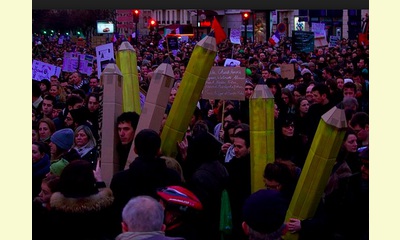|
|
I marched in France on January 11 - What it meant to me
un article par a citizen of France - special to CPNN
In France on 11th January I marched along with 4 million
people of all culture and faiths for non-violence, respect for
human rights—free speech—issues which have shaped
humanity’s agenda for the past 100 years. Respect for the
principles, not the content of the caricatures was the
issue as an outflow of Muslims, Christians, Jews,
Buddhists, Hindus and atheists held banners calling for
fraternity non-violence, human rights, ‘I am Muslim,
Christian, Jew,’ ‘ We are world citizens’. We carried
hundreds of huge pencils thrust toward the sky to invoke
the concept that writing and dialogue should replace the use of arms to resolve differences….As the ancients said:

click on photo to enlarge
‘The ink of scholars is worth more than the blood of
martyrs’ (the Koran)
‘The pen is mightier than the sword’
‘I may disapprove of what you say, but will defend your
right to say it’ (attributed to Voltaire)
The events in France in January have been followed by
governmental, regional and international initiatives, some
controversial and subject to analytical debate, but I will not
go into these issues which may be seen in the discussion
of this article. As I mentioned, the manifestation was a
demonstration of support for the principles of freedom of
expression and ‘republican values’. It was not an
endorsement of the content of the caricatures. It was an
alert call.
In our time, the role of the media has often been to alert the
audience or reader to impending tragedies as witnessed in
the media coverage of the famine of the Sahel, the outflow
of Syrian refugees, ‘ethnic cleansing’ etc. an alert to
governments and the international community to intervene
to save humanity. Reporters risk their lives to cover
conflicts and have been imprisoned and tortured in the
name of freedom of communication—they have a moral
commitment to be a witness in history. The same sense of
mission is reflected in controversial caricatures about
contemporary issues, viewed as harmful to humanity (e.g.
dictators, crimes against humanity, conflicts, misuse of
religion for political objectives, impending disasters) – the
picture condenses a problem into a humorous metaphor
sometimes irreverent for certairoups. But this is not a
defense of religious cartoons, because all religions and
beliefs should be treated with respect and
understanding-- a sense of ‘responsibility’.
Since the beginning of civilization, man has evolved various
forms of communication from the cave drawings 25-30,000
years B.C., the cuneiform writing in Mesopotamia, the
cradle of civilization, the hieroglyphics of Egypt and Latin
American cultures, Aramaic and Hebrew of the Bible, the
Phoenician alphabet improved by the Greek addition of
vowels, Arabic writing which was the language of
scholarship and invention and countless other languages,
oral and written.
Let us take the message of the pencil…and not only to
write about peace, but to create peace in the 21st century
by constructing a veritable ‘culture of peace’ throughout
the world.
|








|
DISCUSSION
Question(s) liée(s) à cet article:
Freedom of expression, Should it be limited?
* * * * *
Commentaire le plus récent:
The following discussion piece by Jan Oberg is reprinted here by permission.
My answer is simple: the issues surrounding the horrific attack on Charlie Hebdo disappeared so fast because the general Western reaction was ill-considered/phony and therefore unsustainable. But there is actually still quite a lot to be discussed.
Secondly, European politicians and media chose – quite uniformly for a professed pluralist society – to not discuss the possible causes. The more convenient interpretation was that the perpetrators were just madmen and people like that should be hunted down and eliminated (like IS in Syria and Iraq).
Without causal analysis we can more easily go straight for more “security”, intelligence, surveillance and more police and military in the streets – in short, symptom treatment.
Further, when we deny human beings any motives we de-humanise them and then they don’t deserve to be heard or treated as humans. Evil is always ‘the other.’
The attack on Charlie Hebdo was not an attack on the entire Western culture, democracy or freedom of expression as such. The perpetrators would hardly know such a concept.
It was an attack at one weekly magazine for what it had misused freedom of expression to do.
Misused?
Freedom and wisdom of expression can be combined. There are at least 4 reasons why we should be proud of the principle of freedom of expression and therefore be wise enough to not misuse it or make it a weapon against others.
Manners, customs, civility, empathy, respect…
I have the freedom to do a lot – tell the lady next to me at a dinner table that I think she is ugly or that her husband who died a month ago was, in my view, the most stupid and criminal person I’ve ever known and therefore she should be happy instead instead of mourning him. But I don’t.
If we always said anything that comes to our mind and ignore every kind of tactfulness and etiquette, we lose our humanity and society would become everybody’s fight against everybody else.
Consequences
As peace researcher Johan Galtung has stated in one of his columns at TFF, you may have freedom to express yourself but not freedom from the consequences of doing so.
If you think you have freedom to express your views about freedom, democracy and human rights in, say, Iraq and invade it to make that point you may do so if you also have the physical power. . ... continuation.

|
|









